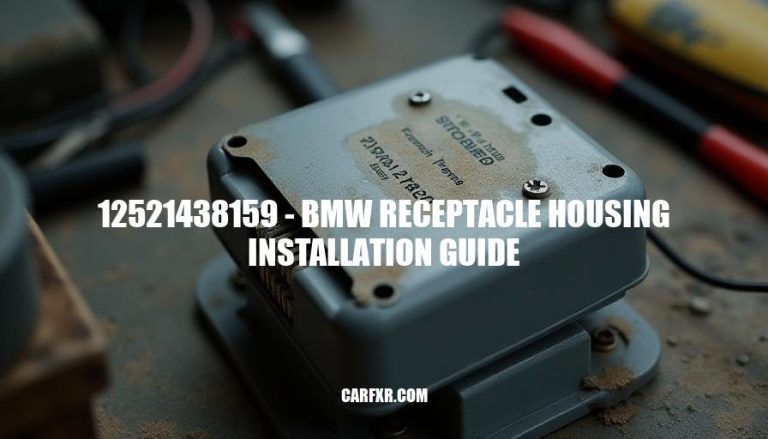
The BMW Receptacle Housing, part number 12521438159, is a crucial component in BMW vehicles. This part is designed to securely house various electrical connectors and ensure proper functioning of the vehicle’s electrical system. It is commonly used in models such as the BMW 1 Series, 3 Series, X Series, and Z Series, spanning from 2006 to 2015.
The receptacle housing plays a vital role in maintaining the integrity and reliability of the electrical connections, which is essential for the overall performance and safety of the vehicle. By providing a stable and protected environment for electrical connectors, this part helps prevent issues related to loose or damaged connections, ensuring that the vehicle operates smoothly and efficiently.
The BMW Part Receptacle Housing 12521438159 is made from high-quality materials, including durable plastic and metal components. The dimensions of the part are approximately 10 cm in length, 5 cm in width, and 3 cm in height. It features a unique identification code, 12-52-1-438-159, which is engraved on the surface for easy identification.
Additionally, it has mounting points and connectors designed for secure installation in BMW vehicles.
The BMW Part Receptacle Housing 12521438159 is a component within the vehicle’s electrical system. It serves as a housing for various electrical connectors and components, ensuring they are securely held in place and protected from damage. This part is essential for the proper operation of the vehicle because it maintains the integrity and functionality of the electrical connections, which are crucial for the vehicle’s overall performance and safety.
Without a properly functioning receptacle housing, the electrical system could become compromised, leading to malfunctions and potential safety hazards.
Screwdrivers (Phillips and flathead)
Socket wrench set
Torque wrench
Pliers
Safety gloves
Safety goggles
Disconnect the battery: Ensure the vehicle’s battery is disconnected to prevent electrical shocks.
Work in a well-ventilated area: Some parts may release harmful fumes when removed.
Use safety gear: Always wear safety gloves and goggles to protect yourself from injury.
Follow manufacturer instructions: Refer to the vehicle’s service manual for specific instructions related to your model.
Locate the old receptacle housing: Open the vehicle’s hood and locate the existing receptacle housing.
Remove the old housing: Use the appropriate screwdrivers and socket wrench to remove the screws and bolts securing the old housing. Carefully disconnect any electrical connectors attached to the housing.
Prepare the new housing: Ensure the new receptacle housing (12521438159) is clean and free of any debris. Align it with the mounting points on the vehicle.
Install the new housing: Secure the new housing using the screws and bolts you removed earlier.
Use a torque wrench to ensure they are tightened to the manufacturer’s specifications.
Reconnect electrical connectors: Carefully reconnect any electrical connectors to the new housing. Ensure they are securely attached.
Reconnect the battery: Reconnect the vehicle’s battery and ensure it is properly secured.
Test the installation: Start the vehicle and test the new receptacle housing to ensure it is functioning correctly.
Inspect for any loose connections: Double-check all connections to ensure everything is secure.
Check for proper fitment: Ensure the new housing is properly aligned and securely fastened.
By following these steps, you should be able to successfully install the BMW Part Receptacle Housing 12521438159. If you encounter any issues, refer to the vehicle’s service manual or consult a professional mechanic.
Visual Inspection: Regularly check the receptacle housing for any signs of wear, corrosion, or damage.
Cleaning: Clean the housing and surrounding area with a mild detergent and water. Avoid using harsh chemicals that can damage the material.
Lubrication: Apply a suitable lubricant to any moving parts to ensure smooth operation.
Check Connections: Ensure all electrical connections are secure and free from corrosion.
Replacement: Replace the housing if any significant damage or wear is observed.
Corrosion: Exposure to moisture can lead to corrosion of electrical contacts.
Wear and Tear: Continuous use can cause wear on the housing and its components.
Loose Connections: Electrical connections may become loose over time, affecting performance.
Physical Damage: Impact or stress can cause cracks or breaks in the housing.
Corrosion: Clean the affected area with a mixture of baking soda and water, then rinse and dry thoroughly.
Wear and Tear: Inspect the housing regularly and replace it if necessary.
Loose Connections: Tighten any loose electrical connections and apply dielectric grease to prevent future loosening.
Physical Damage: Replace the housing if it is cracked or broken to prevent further issues.
BMW Parts Deal, ECS Tuning, Pelican Parts, FCP Euro, Bavarian Autosport, AutohausAZ.
For authenticity, always verify that the vendor is authorized by BMW. Check for OEM (Original Equipment Manufacturer) certification on the product. Review vendor ratings and customer feedback to avoid counterfeits.
When in doubt, reach out directly to BMW or authorized dealerships.
The BMW Part Receptacle Housing 12521438159 is a crucial component that houses electrical connectors and ensures proper functioning of the vehicle’s electrical system. It is made from high-quality materials, including durable plastic and metal components, and features mounting points and connectors for secure installation in BMW vehicles.
This part plays a vital role in maintaining the integrity and reliability of electrical connections, which is essential for overall performance and safety of the vehicle. Without a properly functioning receptacle housing, the electrical system could become compromised, leading to malfunctions and potential safety hazards.
To install this part, tools such as screwdrivers, socket wrench set, torque wrench, pliers, safety gloves, and safety goggles are required. Precautions include disconnecting the battery, working in a well-ventilated area, using safety gear, and following manufacturer instructions.
The installation process involves locating the old receptacle housing, removing it, preparing the new housing, installing it, reconnecting electrical connectors, and testing the installation. A final check is required to ensure all connections are secure and the housing is properly aligned.
Regular maintenance procedures include visual inspection, cleaning, lubrication, checking connections, and replacement if necessary. Common issues with this part include corrosion, wear and tear, loose connections, and physical damage.
Troubleshooting tips include cleaning affected areas, inspecting the housing regularly, tightening loose electrical connections, and replacing the housing if it is cracked or broken.


